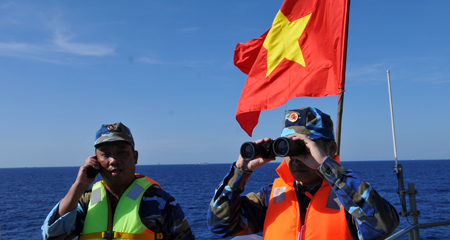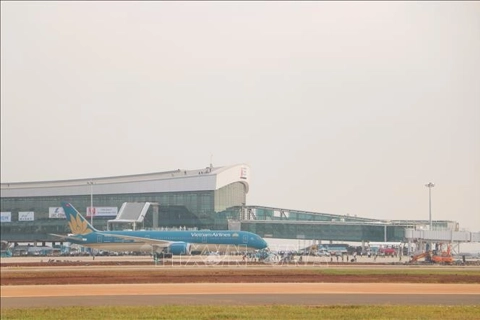Vietnam has never given up sovereignty over Hoang Sa
Under international law, the fact that the Nguyen Dynasty or the French colonialists did not regularly or positively exercise sovereignty in the Hoang Sa Archipelago (Paracel Islands) does not mean that Vietnam gives up its sovereignty over this archipelago.

Vietnamese American space scientist Thai Van Cau made a presentation on the East Sea at a seminar on the East Sea dispute held in the central province of Quang Ngai recently. The study raises a number of critical aspects of international law and historical evidence to prove Vietnam’s sovereignty over the Hoang Sa. VietNamNet Bridge would like to introduce Mr. Cau’s article.
In a meeting on the sidelines of the Nuclear Summit in late March 2014 in The Hague, the Netherlands, Chinese President Xi Jinping urged the U.S. "to have a fair and objective attitude, clearly define right and wrong and do more to find appropriate solutions and improve the situation in the disputes in the South China Sea (East Sea) and East China Sea”.
In response, U.S. President Barack Obama "emphasized the search for solutions to the disputes based on dialogue and international law and the United States will continue to support this effort."
The meeting between the leaders of the two powers, though short, showed the serious nature of territorial water disputes between ASEAN member countries, Japan and China.
The purpose of this study is to review some of the critical angles of international law, which relates to Vietnam’s efforts to protect the sovereignty over the Hoang Sa and Truong Sa (Paracel-Spratly Islands).
International mechanisms to resolve disputes over land or sea between the countries is the International Court of Justice (ICJ), the International Court of Law of the Sea (ITLOS), the arbitral tribunal under Annex VII of the United Nations Convention on the Law of the Sea (UNCLOS), and the Special Court of Arbitration under Annex VIII of UNCLOS.
The ICJ was formed in 1946. The three remaining courts were established after the UNCLOS took effect in 1994. The ICJ and the ITLOS require all parties in the dispute agree to participate in the process of suing.
Vietnam has never lost sovereignty
Based on the operation of the Guangdong provincial government in the early 20th century, Marwyn S. Samuels, American historian, said that China exercised sovereignty in the Hoang Sa, or at least in Phu Lam Island, part of the Hoang Sa, over 10 years before France claimed sovereignty. This argument is incorrect historically and commits serious mistakes.
Firstly, according to historical evidence of the West and Vietnam, in over 200 years, before the French imposed colonialism, Vietnam exercised sovereignty in Hoang Sa in accordance with the standards of international law at the time before the Berlin Convention or as defined in the Berlin Convention 1885 that the place of possession must be derelict land (terra nullius) or abandoned land (terra derelicta), the possessed areas belong to a state and the possession was announced.
After the signing of the Treaty of Tianjin in 1885 with the Qing Dynasty, the French completed the colonial mechanism in Vietnam, and represented Vietnam in international relations.
In the early twentieth century when the Chinese or the Japanese were present in Hoang Sa, Hoang Sa was no longer derelict land, as the Japanese company Mitsui Bussan Kaisha operating in Phu Lam (Woody) Island in the 1920s admitted that when they were questioned, they said that they did not dare to conduct exploration activities on the island by the end of 1920 without giving prior notice to the Saigon Navy Commander, and the commander, standing on military standpoint, did not ban the activities. The French government saw no need to cancel the permission that was given somewhat easily by the naval commander, (because) the Japanese behaved properly with the French authorities and they did not deny the right of the French to the Paracel islands."
After Vietnam was formed in 1949, France returned to Vietnam powers in international relations. When the opportunity came, the Vietnamese delegation officially claimed its sovereignty over Hoang Sa and Truong Sa in the presence of 51 countries attending the San Francisco Conference in 1951.
Secondly, under international law, the fact that the Nguyen Dynasty or the French colonialists did not regularly or positively exercise sovereignty in the Hoang Sa Archipelago (Paracel Islands) in a while does not mean that Vietnam gives up its sovereignty over this archipelago.
In the Western Sahara case, the ICJ refered to the characteristics of an area that can affect life, social activities and politics in that region.
In the lawsuit between the Netherlands and the United States on the island of Palmas, Max Huber, the Swiss expert on international law, said that when a group of islands forms a unit, the fate of the main islands decide the fate of the remaining islands. In other words, exercise sovereignty in a group of island, as a unit, does not demand exercise of sovereignty in each separate island in the island group.
Monique Chemillier-Gendreau, a French expert on international law, referred to the view of Max Huber when talking about France’s exercising of sovereignty in the Truong Sa, and this view is also applied in exercising sovereignty in the Hoang Sa.
In the case between Cameroon and Nigeria, the ICJ commented, "Since having independence, Cameroon has had activity, which clearly shows that this country has no way to abandon its sovereignty over the Bakassi". ICJ decided to give the sovereignty of the Bakassi region to Cameroon.
Sir Robert Jennings Yewdall, a British expert on international law, suggested in principle to give up sovereignty (Abandonment), "The sovereign nation only needs to prove that it does not intend to abandon sovereignty or does not accept the claims of other countries".
Monique Chemillier-Gendreau suggested, "The imperial court of Vietnam was undermined by the conquest and the policy of France to rapidly change the regulations for protection into a colony, (so) their voice on marine sovereignty was nearly neglected. However, when there were opportunities, they still raised their voice."
In summary, the judgment of the ICJ, the perspective of international law experts, and historical evidence of Vietnam and the west show that Vietnam did not lose marine sovereignty, partly or fully, as Marwyn S. Samuels or other authors argued wrongly, in the first period from the 1850s until the mid-1920s, when the Governor of Indochina officially claimed Hoang Sa and Truong Sa.
Principle: "do not disturb stability"
For years, many scholars have believed that this is a long term issue.
In the settlement of disputes between two countries, the ICJ still uses the principle of "non movere quieta" or "do not disturb stability". The ICJ may make advantageous judgment for the countries that are occupying an area of land and waters, although they did not establish clear original sovereignty but they have behaved in an appropriate way for a period of time.
In the lawsuit between Norway and Sweden, this principle was one of the factors that Sweden received favorable decisions on Grisbadarna Banks.
In the lawsuit between Bahrain and Qatar, this principle is also one of the factors that Bahrain received a favorable decision on the Hawar Islands.
The principle of "non movere quieta" is not known widely to many researchers, but Gian Quan Ba, a Chinese scholar, indirectly talked about the principle three years ago: "If Beijing cannot solve disputes and assert sovereignty in the islands and territorial waters by 2020, this will be a big challenge for China, because according to a principle of international law, if a country occupies an area successfully for over 50 years, the area may become part of its territory. But the prerequisite is that the occupation is not rejected by other countries."
According to Wu Shicun, Director of the only national-level research institute on the East Sea in China, the East Sea dispute started to become tense in the early 1970s.
Although there is no evidence that supports the 50 years as a principle requiring the "non movere quieta" principle, there are a number of points that should be noted. For nearly 20 years, after the normalization of bilateral relations between Vietnam and China, China has taken the time to build up forces for the ambition of monopolizing the East Sea: China has representative judges in the ICJ and the ITLOS; China completed hundreds of doctoral thesis and held hundreds of seminars on the East Sea topic in the 2000s; the Chinese navy developed strongly and its presence has spread across the East Sea.
Consequently, there is a gap between Vietnam and China in the efforts of researching international law and in other areas related to the East Sea.
Vietnam and China have regularly protested the actions of other countries related to the East Sea and claimed the Hoang Sa-Truong Sa (or Nansha and Xisha as China calls Hoang Sa and Truong Sa).
In the case between Nicaragua and Honduras in the Caribbean Sea, the ICJ noted that the constant claims of Nicaragua is not sufficient compared with the exercise of sovereignty of Honduras. This shortcoming of Nicaragua became one of the factors that Honduras received the favorable decision.
The ICJ’s decision shows that on the objection of infringement of sovereignty is a necessary condition in international law, but it is not sufficient to protect the country's sovereignty.
According to M. Taylor Fravel, U.S. expert on international relations, since the establishment of the PRC in 1949, of the total 23 territorial and water disputes between China and its neighbors, China solved the disputes through negotiations 17 times and used force six times, including three times with Vietnam: in Hoang Sa in 1974, the north border region in 1979, and Truong Sa in 1988. The three remaining times were with Taiwan, India and the Soviet Union.
The UN Charter, Chapter I, Article 2, paragraph 4, prohibits members of the United Nations to use force or threaten to use force against the territorial integrity or political independence of another member.
UN Charter, Chapter VII, Article 51, refers to the individual or collective self-defense rights when a member is attacked.
For over 30 years, Chinese scholars and some Western scholars have supported China, by directly or indirectly distorting the truth when arguing that China made the "self-defense rights or protection of "territorial integrity" in the conflict with Vietnam.
Although the principle of "non movere quieta" has not been mentioned by the ICJ in the case of using force for illegal occupation, China has cleverly combined the principle of "non movere quieta" and subtle tricks to promote their favorable balance of historical and legal evidence over the Hoang Sa-Truong Sa Islands, gradually increasing strength for the ambitious "cow tongue" claims in the East Sea.








